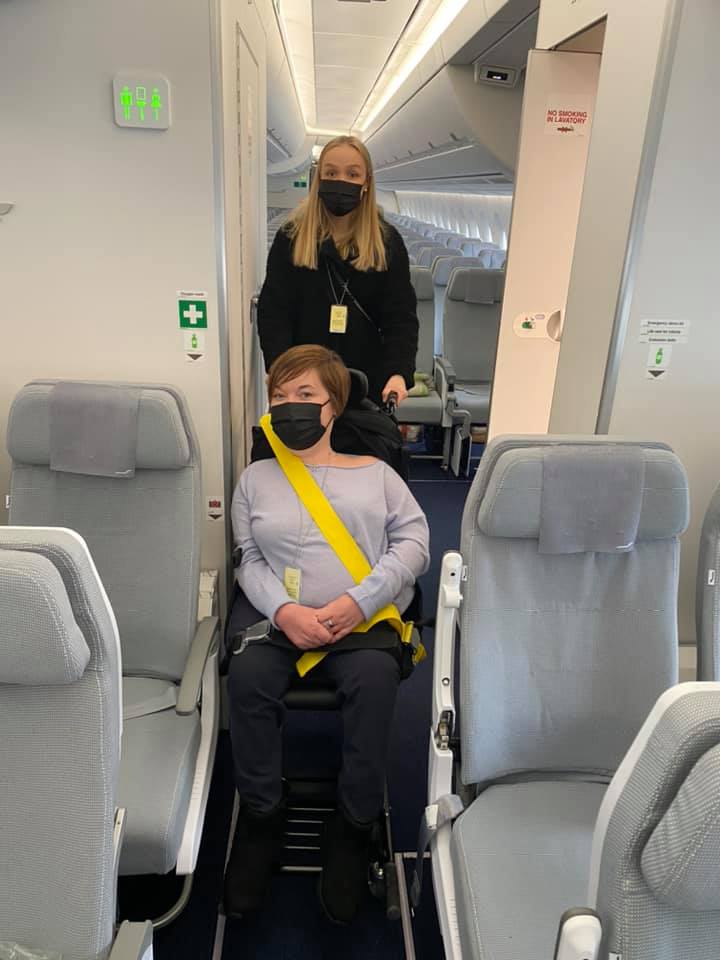We have now released the findings of our survey on air travel for wheelchair users. In collaboration with Flying Disabled, ableMove asked 336 wheelchair (powered and manual) users from across the globe about their experiences in aviation so we can keep driving forward positive changes across the industry for all wheelchair users.
Our findings have highlighted an urgent need for consistency across the industry in the form of a globally recognised standard that ensures the same level of service at every airline and airport.
Our survey found that the biggest concerns for wheelchair users were around the issues of wheelchairs being lost or damaged; transferring on and off aircraft; seating in the cabin; boarding and disembarking processes; carriage of medical equipment and toileting arrangements for wheelchair users, both at airports and on aircraft.
The impact of these concerns is worrying. Only 25% of wheelchair users we spoke to would rate their overall experiences of flying by air as good, very good or extremely good. A huge 43% of wheelchair users stated that they no longer feel able to fly because of the issues we are highlighting through this report.
We recognise that there have been advancements made in recent years in levelling up accessibility issues as well as the introduction of enhanced regulatory frameworks, but it is clear from our findings that these do not go far enough, and we are now calling on decision makers and those in charge to work together to ensure that wheelchair users are able to fly without the added anxieties that we have found are a very common theme amongst this group of travellers.
Wheelchair users are one of the smallest categories of passengers with reduced mobility in the aviation industry, equating to between 1% and 2% of overall passenger numbers globally. In the UK during 2018 there were around 3.2m total passengers with reduced mobility requests and only between 160k and 224k of these were from wheelchair users. Our vast experience in this area leads us to believe that the industry perceives, due to such low numbers of wheelchair users flying, it isn’t economically viable to change the way things are currently done as the demand just isn’t there. Our survey and many years of experience show just the opposite, the appetite for air travel from wheelchair users is vast and growing but, in many cases, air travel is deemed an impossibility by potential customers who use wheelchairs because of the issues we have highlighted. One survey respondent told us; “Flying as a wheelchair user is completely humiliating and current procedures are a deterrent to fly at all!”
One of the most impactful findings we discovered was that 62% of respondents deliberately dehydrate and starve themselves in order to fly, and often this process begins up to 24 hours before a flight, so the wheelchair user is completely confident that they will not need to use the toilet whilst on an aircraft. Not only is this incredibly damaging to health but also means that whilst for some wheelchair users they might be able to manage a short haul flight using this method, long haul flights for all customers in wheelchairs are an impossibility. Toilets on all aircraft should be fully accessible for all passengers, not just those who are more mobile.
Alarmingly, only 53% of respondents didn’t even know transfer equipment on aircrafts existed, let alone having had any experiences using it. This finding clearly demonstrates the lack of staff training and consistency in transfer procedures across the industry. Only 2% of people we surveyed said they had felt safe when using transfer equipment such as aisle chairs. “As soon as you go to the transfer chair and onto the airplane you immediately feel like you don’t belong if you are disabled. Nothing is made for us and everything is so difficult too, and it is very disheartening because I would love to travel more if it weren’t so hard,” said one survey respondent.
43% of people we asked, said they used to fly but have since stopped flying and the two main reasons for this are bad experiences and personal injury caused by inexperienced or incorrectly trained staff. That equates to almost half of all survey respondents not being able to fly anymore due to the difficulties involved, and for airlines, when this statistic is applied more widely, equates to a lot of lost ticket sales.
ableMove Founder Josh Wintersgill commented on the report findings; “There are some easy fixes that airlines can put in place with immediate effect that tackle the issues we have found in this survey. These are providing wheelchair users with guarantees that wheelchairs will not be lost or damaged in transit and changing the timing of when wheelchair users are boarded so as to maintain dignity for the customer. Alongside these measures, airlines can then begin the dialogue with industry and innovators about improving toilet arrangements for wheelchair customers. The ultimate fix of course is the wheelchair in the cabin solution.”
The findings from our survey point to a clear ‘wheelchair in the cabin’ solution. This will give wheelchair customers the safety, dignity and comfort they are entitled to in the same way that more mobile passengers expect these basic rights. Wheelchairs in the cabin will get more wheelchair users in the sky, flying more frequently and in larger groups whilst contributing to significant growth in tickets sales for airlines. It will remove the need for specialist equipment to board passengers thus saving time and manpower during boarding and disembarking procedures. Most importantly of all, wheelchairs in the cabin will allow wheelchair customers the same freedoms as more mobile passengers and level up what is currently a very uneven playing field.
For further comment or press enquiries please contact Josh Wintersgill, ableMove Founder; joshwintersgill@ablemove.co.uk or Lizzie Martens, Marketing Assistant on lizziemartens@ablemove.co.uk
You can read the full report here:
https://ablemove.co.uk/wp-content/uploads/2021/04/Wheelchair-Customer-Aviation-Survey-FINAL.pdf






Leave A Comment